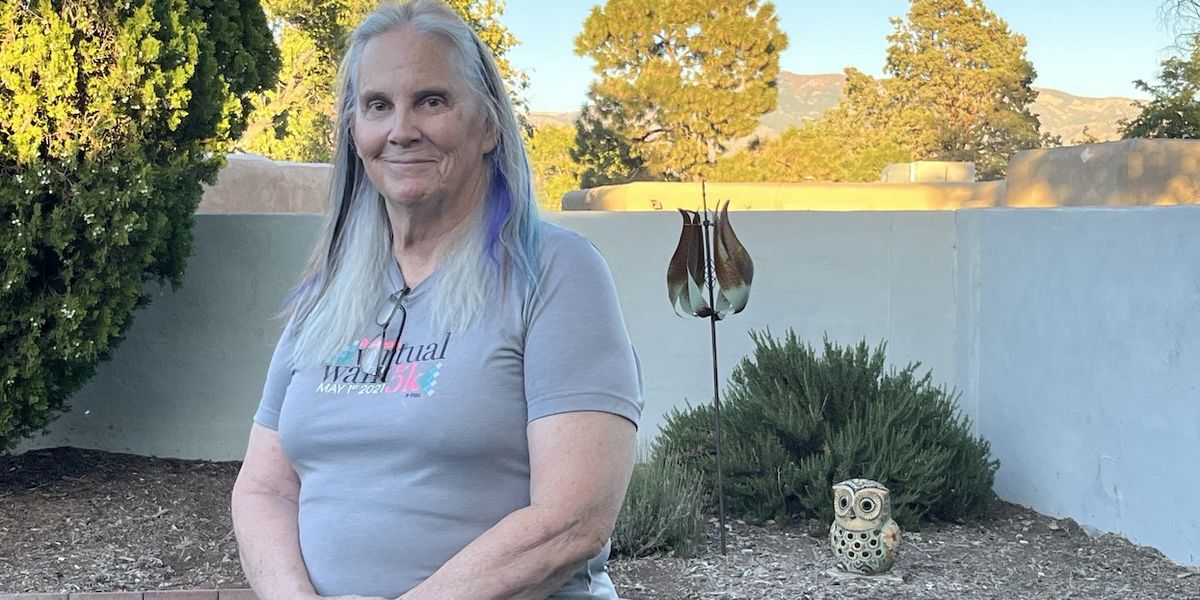New Mexico
As Transgender ‘Refugees’ Flock to New Mexico, Waitlists Grow

ALBUQUERQUE, N.M. — This summer, Sophia Machado packed her bags and left her home in Oregon to move to Albuquerque, New Mexico, where her sister lived and where, Machado had heard, residents were friendlier to their transgender neighbors and gender-affirming health care was easier to get.
Machado, 36, is transgender and has good health insurance through her job. Within weeks, she was able to get into a small primary care clinic, where her sister was already a patient and where the doctor was willing to refill her estrogen prescription and refer her to an endocrinologist.
She felt fortunate. “I know that a lot of the larger medical institutions here are pretty slammed,” she said.
Other patients seeking gender-affirming health care in New Mexico, where access is protected by law, haven’t been as lucky.
After her primary care doctor retired in 2020, Anne Withrow, a 73-year-old trans woman who has lived in Albuquerque for over 50 years, sought care at Truman Health Services, a clinic specializing in transgender health care at the University of New Mexico. “They said, ‘We have a waiting list.’ A year later they still had a waiting list. A year later, before I managed to go back, I got a call,” she said.
But instead of the clinic, the caller was a provider from a local community-based health center who had gotten her name and was able to see her. Meanwhile, the state’s premier clinic for transgender health is still at capacity, as of October, and unable to accept new patients. Officials said they have stopped trying to maintain a waitlist and instead refer patients elsewhere.
Over the past two years, as nearly half of states passed legislation restricting gender-affirming health care, many transgender people began relocating to states that protect access. But not all those states have had the resources to serve everyone. Cities like San Francisco, Chicago, and Washington, D.C., have large LGBTQ+ health centers, but the high cost of living keeps many people from settling there. Instead, many have chosen to move to New Mexico, which has prohibited restrictions on gender-affirming care, alongside states like Minnesota, Colorado, Vermont, and Washington.
But those new arrivals have found that trans-friendly laws don’t necessarily equate to easy access. Instead, they find themselves added to ever-growing waitlists for care in a small state with a long-running physician shortage.
“With the influx of gender-refugees, wait times have increased to the point that my doctor and I have planned on bi-yearly exams,” Felix Wallace, a 30-year-old trans man, said in an email.
When T. Michael Trimm started working at the Transgender Resource Center of New Mexico in late 2020, he said, the center fielded two or three calls a month from people thinking about moving to the state. “Since then, it has steadily increased to a pace of one or two a week,” he said. “We’ve had folks from as far away as Florida and Kentucky and West Virginia.” That’s not to mention families in Texas “looking to commute here for care, which is a whole other can of worms, trying to access care that’s legal here, but illegal where they live.”
In its 2023 legislative session, New Mexico passed several laws protecting LGBTQ+ rights, including one that prohibits public bodies from restricting gender-affirming care.
“I feel really excited and proud to be here in New Mexico, where it’s such a strong stance and such a strong refuge state,” said Molly McClain, a family medicine physician and medical director of the Deseo clinic, which serves transgender youth at the University of New Mexico Hospital. “And I also don’t think that that translates to having a lot more care available.”
The U.S. Department of Health and Human Services has designated part or all of 32 of New Mexico’s 33 counties as health professional shortage areas. A 2022 report found the state had lost 30% of its physicians in the previous four years. The state is on track to have the second-largest physician shortage in the country by 2030, and it already has the oldest physician workforce. The majority of providers offering gender-affirming care are near Albuquerque and Santa Fe, but 60% of the state’s population live in rural regions.
Even in Albuquerque, waitlists to see any doctor are long, which can be difficult for patients desperate for care. McClain noted that the rates of self-harm and suicidal ideation can be very high for transgender people who are not yet able to fully express their identity.
That said, Trimm adds that “trans folks can be very resilient.”
Some trans people have to wait many years to receive transition-related medical care, even “when they’ve known this all their lives,” he said. Although waiting for care can be painful, he hopes a waitlist is easier to endure “than the idea that you maybe could never get the care.”
New Mexico had already become a haven for patients seeking abortion care, which was criminalized in many surrounding states over the past two years. But McClain noted that providing gender-affirming care requires more long-term considerations, because patients will need to be seen regularly the rest of their lives. We’re “working really hard to make sure that it is sustainable,” she said.
As part of that work, McClain and others at the University of New Mexico, in partnership with the Transgender Resource Center, have started a gender-affirming care workshop to train providers statewide. They especially want to reach those in rural areas. The program began in June and has had about 90 participants at each of its biweekly sessions. McClain estimates about half have been from rural areas.
“It’s long been my mantra that this is part of primary care,” McClain said. As New Mexico has protected access to care, she’s seen more primary care providers motivated to offer puberty blockers, hormone therapy, and other services to their trans patients. “The point really is to enable people to feel comfortable and confident providing gender care wherever they are.”
There are still significant logistical challenges to providing gender-affirming care in New Mexico, said Anjali Taneja, a family medicine physician and executive director of Casa de Salud, an Albuquerque primary care clinic serving uninsured and Medicaid patients.
“There are companies that are outright refusing to provide [malpractice] insurance coverage for clinics doing gender-affirming care,” she said. Casa de Salud has long offered gender-affirming care, but, Taneja said, it was only this year that the clinic found malpractice insurance that would allow it to treat trans youth.
Meanwhile, reproductive health organizations and providers are trying to open a clinic — one that will also offer gender-affirming care — in southern New Mexico, with $10 million from the state legislature. Planned Parenthood of the Rocky Mountains will be part of that effort, and, although the organization does not yet offer gender-affirming care in New Mexico, spokesperson Kayla Herring said, it plans to do so.
Machado said the vitriol and hatred directed at the trans community in recent years is frightening. But if anything good has come of it, it’s the attention the uproar has brought to trans stories and health care “so that these conversations are happening, rather than it being something where you have to explain to your doctor,” she said. “I feel very lucky that I was able to come here because I feel way safer here than I did in other places.”
This article was supported by the Journalism and Women Symposium Health Journalism Fellowship, with the support of The Commonwealth Fund.
KFF Health News is a national newsroom that produces in-depth journalism about health issues and is one of the core operating programs at KFF—an independent source of health policy research, polling, and journalism. Learn more about KFF.
Subscribe to KFF Health News’ free Morning Briefing.

New Mexico
Learn more about the Winter Wonderland at Expo New Mexico

New Mexico
Snap calls New Mexico's child safety complaint a 'sensationalist lawsuit'
Snap has accused New Mexico’s attorney general of intentionally looking for adult users seeking sexually explicit content in order to make its app seem unsafe in a filing asking the court to dismiss the state’s lawsuit. In the document shared by The Verge, the company questioned the veracity of the state’s allegations. The attorney general’s office said that while it was using a decoy account supposed to be owned by a 14-year-old girl, it was added by a user named Enzo (Nud15Ans). From that connection, the app allegedly suggested over 91 users, including adults looking for sexual content. Snap said in its motion to dismiss, however, that those “allegations are patently false.”
It was the decoy account that searched for and added Enzo, the company wrote. The attorney general’s operatives were also the ones who looked for and added accounts with questionable usernames, such as “nudenude_22” and “xxx_tradehot.” In addition, Snap is accusing the office of “repeatedly [mischaracterizing]” its internal documents. The office apparently cited a document when it mentioned in its lawsuit that the company “consciously decided not to store child sex abuse images” and when it suggested that it doesn’t report and provide those images to law enforcement. Snap denied that it was the case and clarified that it’s not allowed to store child sexual abuse materials (CSAM) on its servers. It also said that it turns over such materials to the National Center for Missing and Exploited Children.
The New Mexico Department of Justice’s director of communications was not impressed with the company’s arguments. In a statement sent to The Verge, Lauren Rodriguez accused Snap of focusing on the minor details of the investigation in an “attempt to distract from the serious issues raised in the State’s case.” Rodriguez also said that “Snap continues to put profits over protecting children” instead of “addressing… critical issues with real change to their algorithms and design features.”
New Mexico came to the conclusion that Snapchat’s features “foster the sharing of child sexual abuse material (CSAM) and facilitate child sexual exploitation” after a months-long investigation. It reported that it found a “vast network of dark web sites dedicated to sharing stolen, non-consensual sexual images from Snap” and that Snapchat was “by far” the biggest source of images and videos on the dark web sites that it had seen. The attorney general’s office called Snapchat “a breeding ground for predators to collect sexually explicit images of children and to find, groom and extort them.” Snap employees encounter 10,000 sextortion cases each month, the office’s lawsuit said, but the company allegedly doesn’t warn users so as not to “strike fear” among them. The complaint accused Snap’s upper management of ignoring former trust and safety employees who’d pushed for additional safety mechanisms, as well.
New Mexico
Inmate country store in Santa Fe to open Friday

The Old Gumby’s Country Store in Santa Fe has a lot to offer, not only to shoppers, but the products’ creators too.
SANTA FE, N.M. – The Old Gumby’s Country Store in Santa Fe has a lot to offer, not only to shoppers, but the products’ creators too.
“This could be the first opportunity for them to feel confident about something,” New Mexico Corrections Department’s Public Information Officer, Brittany Roembach.
That’s because all the people who handmade these things are serving time in New Mexico prisons.
“Welding, woodworking, we have a print shop, we have an embroidery shop,” said Ron Martinez, an administrative manger for Correction Industries.
The inmates have to apply for the program like a job. The proceeds from what they sell at the store goes back into the program and others like it.
The inmates even make an hourly wage.
“Varies on the jobs based on what they’re doing, it’s a dollar up to two dollars,” Martinez said.
But to be able to share their work with the community is priceless.
“They’re learning that skill, OK? They’re building products that are being sold and that builds a lot of self-worth for them,” said Martinez.
Not only does it build self-worth, but it helps them start fresh once they are released.
“One of the inmates who makes these he’s getting out soon and his family wants, he told me that his family is helping him to potentially start his own studio to sell rugs. So they can truly take it and turn it into a career,” said Roembach.
The store will open its doors Friday from 10 a.m. to 3 p.m. It is cash only, so make sure you hit the ATM before you head out. It’s going to be open once a month to give the inmates some time to replenish their stock.
For more information on Old Gumby’s Country Store, click here.
-
Business1 week ago
Column: OpenAI just scored a huge victory in a copyright case … or did it?
-

 Health1 week ago
Health1 week agoBird flu leaves teen in critical condition after country's first reported case
-

 Business6 days ago
Business6 days agoColumn: Molly White's message for journalists going freelance — be ready for the pitfalls
-
World1 week ago
Sarah Palin, NY Times Have Explored Settlement, as Judge Sets Defamation Retrial
-

 Science3 days ago
Science3 days agoTrump nominates Dr. Oz to head Medicare and Medicaid and help take on 'illness industrial complex'
-

 Politics5 days ago
Politics5 days agoTrump taps FCC member Brendan Carr to lead agency: 'Warrior for Free Speech'
-
/cdn.vox-cdn.com/uploads/chorus_asset/file/25739950/247386_Elon_Musk_Open_AI_CVirginia.jpg)
/cdn.vox-cdn.com/uploads/chorus_asset/file/25739950/247386_Elon_Musk_Open_AI_CVirginia.jpg) Technology4 days ago
Technology4 days agoInside Elon Musk’s messy breakup with OpenAI
-

 Lifestyle5 days ago
Lifestyle5 days agoSome in the U.S. farm industry are alarmed by Trump's embrace of RFK Jr. and tariffs




















